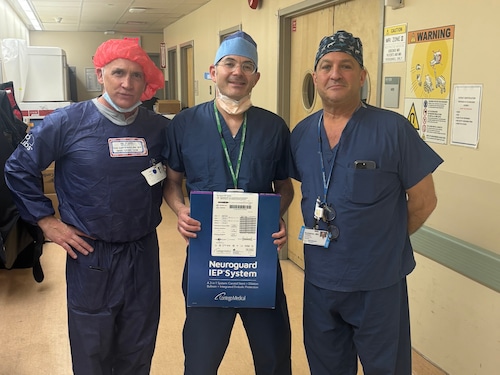STATEN ISLAND, N.Y. — Ocean Breeze hospital leadership has revealed that Northwell/Staten Island University Hospital is the first medical facility in the tri-state area to treat carotid artery disease (CAD) using a novel technology.
According to Drs. Raphael Sacho and Jonathan Scheiner of SIUH, the Neurogard IEP System is an FDA-approved device that lowers the risk of stroke both during and after surgeries meant to restore blood flow in restricted carotid arteries.
About 3% of persons 65 and older have CAD, which is brought on by the carotid arteries that feed blood to the brain narrowing. According to the doctors, up to one-third of all stroke cases are caused by this disorder, making it a major cause of stroke.
High blood pressure, diabetes, high LDL cholesterol, and a history of smoking are risk factors.
The first three-in-one stent system, the Neuroguard IEP System, consists of an embolic protection filter, a dilatation balloon, and a stent.
According to the hospital statement, this all-in-one method improves protection against embolic particles that can cause strokes, permits precise placement, and eliminates procedural complexity in contrast to standard systems that call for many devices.
The SIUH surgeons stated that because the system is significantly smaller than standard filters, it is better able to detect microscopic clots or particles (micro-emboli) that other filters would overlook.
The Ocean Breeze hospital’s director of cerebrovascular and endovascular neurosurgery, Sacho, stated, “We always strive to give our patients the safest and most efficient treatment options available.” Our capacity to precisely, effectively, and safely treat carotid artery disease has advanced significantly with the introduction of the Neuroguard IEP System.
According to Sacho, the Neuroguard IEP System’s built-in microfilter is revolutionary. He claimed that the balloon-mounted stent design offers fine control for ideal placement and that it enables us to decrease both clinical and subclinical strokes.
According to the statement, the system’s clinical studies showed one of the lowest procedural risks for carotid artery stenting, with findings indicating a 99% freedom from any stroke at 30 days and no significant strokes recorded for up to two years after the treatment.
Being one of the first institutions in the country to provide this game-changing technology is an honor for us, Scheiner added. Being the best in terms of patient outcomes, safety, and accuracy is more important than simply being the first.
According to hospital officials, patients receiving therapy using the Neuroguard IEP System usually have shorter hospital stays and can go home the day after the procedure.
According to the statement, the less intrusive method also eliminates the need for general anesthesia, which is frequently necessary for conventional carotid endarterectomy surgery.
The neurology department at SIUH has won numerous honors, including U.S. News & World Report’s designation as a Best Regional Hospital and a High Performing Hospital in Neurology and Neurosurgery.
According to the release, it also received The Joint Commission’s Advanced Comprehensive Stroke Center Certification for its North campus and the American Heart Association’s Get With The Guidelines Gold Plus Award for stroke care.
More health stories on SILive
-
Highly contagious virus is on the rise nationwide
-
FDA approves first-ever medication for obstructive sleep apnea
-
It s called the Winter Arc. And for some, it s replacing New Year s resolutions
-
Staten Island flu infections rising faster than cases statewide
Note: Every piece of content is rigorously reviewed by our team of experienced writers and editors to ensure its accuracy. Our writers use credible sources and adhere to strict fact-checking protocols to verify all claims and data before publication. If an error is identified, we promptly correct it and strive for transparency in all updates, feel free to reach out to us via email. We appreciate your trust and support!







+ There are no comments
Add yours